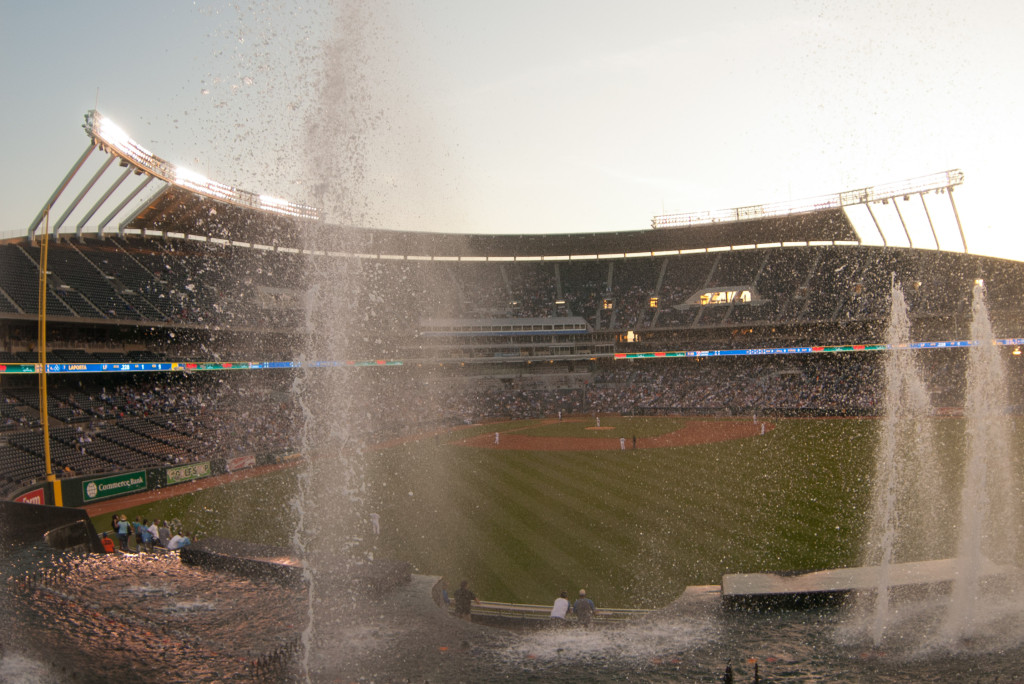With the franchise set for an ownership change, questions are emerging about whether discussions of a new Kansas City Royals ballpark will gain momentum.
The Royals are heading toward a sale, as a group of local investors led by John Sherman has reached an agreement to buy the franchise from David Glass and his family. A sale has not been finalized yet and is subject to Major League Baseball approval, with MLB expected to discuss the issue during its November 20-21 owners’ meetings in Dallas. Still, the looming sale has reignited a debate about whether Kauffman Stadium should eventually be replaced by a new downtown ballpark.
Kauffman Stadium is currently the sixth-oldest ballpark in MLB, having opened for the Royals in 1973. More than a decade ago, there was some discussion about replacing it with a new ballpark in the city’s downtown, but ultimately Kauffman Stadium’s future was solidified after Jackson County voters decided in 2006 to approve a 0.375 percent sales tax hike to upgrade it and neighboring Arrowhead Stadium, home of the NFL’s Chiefs. As part of the renovations, the Royals extended their lease to Kauffman Stadium to 2031, though that has not slowed speculation in recent years that the next move for the organization could be a new downtown ballpark.
Now that the Sherman-led group is poised to take over the franchise, the questions about a new ballpark are surfacing in full force. Sherman, for his part, has not outlined any long-term plans for the Royals’ facility situation, but there could be a few viable sites downtown for a new ballpark, as the Kansas City Star reported earlier this month:
One is at and around where the Kansas City Area Transportation Authority currently occupies 24 acres for its headquarters and bus station at 18th Street and Forest Avenue, just east of U.S. Highway 71.
“I’ve heard those rumors and I would be the first one to jump up and down and say absolutely,” said Robbie Makinen, chief executive of the KCATA.
The KCATA site’s allure is that a baseball stadium would provide a linkage between the Crossroads Arts District and the 18th & Vine entertainment district, an area where a current array of warehouse and industrial buildings serves as an unappealing corridor between the two attractions.
The KCATA site is complicated somewhat by the proposed development of what’s called a Keystone Innovation District at 18th Street and Troost Avenue that would occupy a portion of KCATA-controlled property, but the project has not yet broken ground.
Another leading site is East Village, several blocks of mostly undeveloped space east of City Hall and construction company JE Dunn’s headquarters.
Keep in mind that discussions over a new Royals ballpark, if they do indeed launch, would likely unfold over a period of years and not yield an immediate solution. The team’s lease with Jackson County commits it to Kauffman Stadium into the next decade, and plenty of details about a prospective new ballpark—including its site and funding—would have to be ironed out. Funding will likely prove to be a complicated issue if public dollars are sought, with a referendum needed if a bistate tax to make the financing of a new ballpark a regional effort is one that local officials or boosters of a new facility ultimately pursue.
Another variable that would likely have to be considered is whether Jackson County and/or Kansas City officials also have to engage with the Chiefs in discussions about a new or renovated stadium, effectively raising the price of long-term sports facility planning. Although the franchise has made recent upgrades to Arrowhead Stadium, its lease also expires in 2031 and that could prompt discussions about whether another round of major renovations is in order or if it’s time to look at a new NFL facility all together.
For now, there are still plenty of unknowns surrounding whether the Royals will earnestly pursue a new downtown ballpark and it might take time for the Sherman-led group—once it does officially buy the team—to map out its preferred plan. Still, the situation will be one worth keeping an eye on, as the desire for a new downtown ballpark has remained strong among Kansas City’s downtown business community in the aftermath of Kauffman Stadium renovations and an ownership change could prompt a more serious consideration about whether that is a viable option.
This article first appeared in the Ballpark Digest newsletter. Are you a subscriber? It’s free, and you’ll see features like this before they appear on the Web. Go here to subscribe to the Ballpark Digest newsletter.

